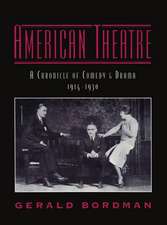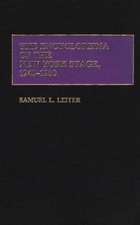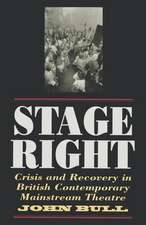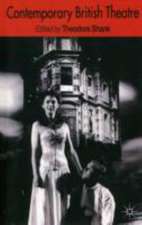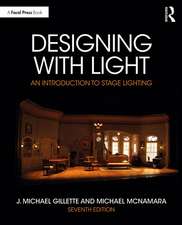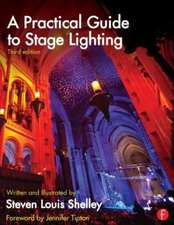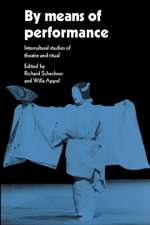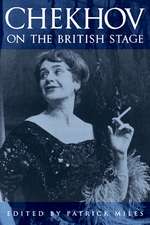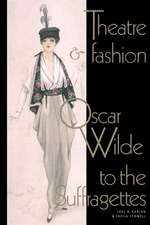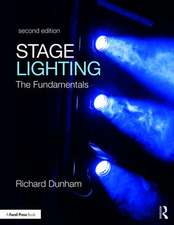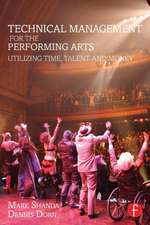Concert Lighting: The Art and Business of Entertainment Lighting
Autor James Moody, Paul Dexteren Limba Engleză Hardback – 27 sep 2016
| Toate formatele și edițiile | Preț | Express |
|---|---|---|
| Paperback (1) | 358.33 lei 6-8 săpt. | |
| Taylor & Francis – 19 sep 2016 | 358.33 lei 6-8 săpt. | |
| Hardback (1) | 1035.13 lei 6-8 săpt. | |
| Taylor & Francis – 27 sep 2016 | 1035.13 lei 6-8 săpt. |
Preț: 1035.13 lei
Preț vechi: 1378.49 lei
-25% Nou
Puncte Express: 1553
Preț estimativ în valută:
198.07€ • 206.80$ • 163.93£
198.07€ • 206.80$ • 163.93£
Carte tipărită la comandă
Livrare economică 05-19 aprilie
Preluare comenzi: 021 569.72.76
Specificații
ISBN-13: 9781138942929
ISBN-10: 1138942928
Pagini: 382
Dimensiuni: 210 x 280 mm
Greutate: 1.59 kg
Ediția:Revised
Editura: Taylor & Francis
Colecția Routledge
Locul publicării:Oxford, United Kingdom
ISBN-10: 1138942928
Pagini: 382
Dimensiuni: 210 x 280 mm
Greutate: 1.59 kg
Ediția:Revised
Editura: Taylor & Francis
Colecția Routledge
Locul publicării:Oxford, United Kingdom
Public țintă
Postgraduate, Professional, Professional Practice & Development, and UndergraduateCuprins
1. The Rise of the Concert Lighting Field
2. Touring Personnel (Unions are a side note)
3. The Importance of Business, and Effective Communications
4. Pre-Production
5. The Design Stage
6. The Designer’s WorkBox
7. Writing Music Cues
8. Life on the Road
9. Venues and Local Lighting Equipment Theaters, Amphitheaters, Arenas, Casinos,
Festivals, Fairs, and Racetracks
10. Working Outside the United States
11. Risk Assessment and Safety
12. Finding Solutions
EQUIPMENT DESIGNED TO TRAVEL
13. Lifts, Hoists and Roofs
14. Lighting Trusses
15. Lighting Consoles
16.Protocol, Control, and Ancillary Enablers
17. Conventional Lighting and Accessories
18. Portable Dimming and Distribution
19. Automated Lighting
20. LED Lighting
21. LED Screens, Projection and Media Servers
22.Lasers, Smoke and Pyrotechnic Effects
DESIGNING WITH TOURING EQUIPMENT
23. Master Designers
24. Designers’ Perspective: Art vs. Business
25. The Artist Perspective (and the Producers’)
26. Live Broadcast, Film and Video
27. Looking Forward
2. Touring Personnel (Unions are a side note)
3. The Importance of Business, and Effective Communications
4. Pre-Production
5. The Design Stage
6. The Designer’s WorkBox
7. Writing Music Cues
8. Life on the Road
9. Venues and Local Lighting Equipment Theaters, Amphitheaters, Arenas, Casinos,
Festivals, Fairs, and Racetracks
10. Working Outside the United States
11. Risk Assessment and Safety
12. Finding Solutions
EQUIPMENT DESIGNED TO TRAVEL
13. Lifts, Hoists and Roofs
14. Lighting Trusses
15. Lighting Consoles
16.Protocol, Control, and Ancillary Enablers
17. Conventional Lighting and Accessories
18. Portable Dimming and Distribution
19. Automated Lighting
20. LED Lighting
21. LED Screens, Projection and Media Servers
22.Lasers, Smoke and Pyrotechnic Effects
DESIGNING WITH TOURING EQUIPMENT
23. Master Designers
24. Designers’ Perspective: Art vs. Business
25. The Artist Perspective (and the Producers’)
26. Live Broadcast, Film and Video
27. Looking Forward
Notă biografică
Jim Moody is the Head of the Technical Theatre Program, Technical Director, and Lighting Designer for The Theatre Academy at Los Angeles City College (A Professional Conservatory Program). Considered one of the founders of concert lighting he received the first Concert Lighting Designer of the Year Award from Performance magazine in 1980. Active also in television, his work has been recognized with two Emmy nominations and one team award.
Paul Dexter has been the lighting and set designer for such concerts and concert tours as Rick James, Motley Crue, DIO, Ozzy Osbourne, and Elton John, Paul McCartney, and Rod Stewart. Paul is president of his own design firm, Masterworks Design, Inc. His recent activities include touring the world with REO Speedwagon as production and lighting designer, production designer for Heaven & Hell and architectural lighting designer for Activision Motion Capture Studios.
Paul Dexter has been the lighting and set designer for such concerts and concert tours as Rick James, Motley Crue, DIO, Ozzy Osbourne, and Elton John, Paul McCartney, and Rod Stewart. Paul is president of his own design firm, Masterworks Design, Inc. His recent activities include touring the world with REO Speedwagon as production and lighting designer, production designer for Heaven & Hell and architectural lighting designer for Activision Motion Capture Studios.
Descriere
Concert Lighting: Tools, Techniques, Art, and Business Fourth Edition provides readers with an updated look at how to succeed in the complex world of concert lighting design and technology. The authors have reorganized the book into three comprehensive and thoroughly revised sections, covering history, equipment and technology, and design.

